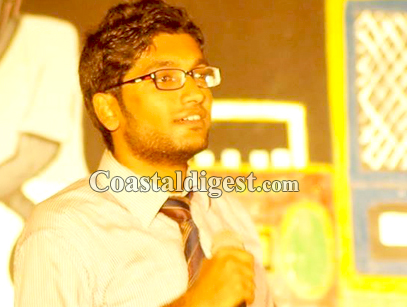 Announcing this at a press meet in Bangalore, VTU Vice-Chancellor H Maheshappa said Mr Musthafa has scored 91.98 percent, securing the first place, among a total of 12,000 students who had appeared in the civil engineering examinations at the University, which is considered the top most university of Karnataka and under which a total 190 colleges are running.
Announcing this at a press meet in Bangalore, VTU Vice-Chancellor H Maheshappa said Mr Musthafa has scored 91.98 percent, securing the first place, among a total of 12,000 students who had appeared in the civil engineering examinations at the University, which is considered the top most university of Karnataka and under which a total 190 colleges are running.
Anjuman Hami-e-Muslimeen (AHM) General Secretary Abdur Raheem Jukaku said in a press release, this was the third time a student of AITM had secured a university rank.
“Our students have secured ranks in the years 2000 and 2007 previously. It is a matter of great pride for our institution,” he said.
“In 2007, one of students in the civil engineering department, Prasanna Kumar had secured the first rank and he was awarded with four gold medals,' said AITM vice principal professor Mushtaque Ahmed Bhavikatte.
AHM president S M Syed Khalil ur Rahman, Additional Secretary Siddique Ismail, college secretary S M Syed Saleem, Javid Hussain Armar and management members have congratulated Mustafa Nabeel for his achievement.
Other rank holders
Anushree R. of B.N.M. Institute of Technology, Bangalore, has got eight gold medals. She has got first rank in B.E. (Electrical & Electronics Engineering). Waseem Ahmad Ahanger of Vidyavardhaka College of Engineering, Mysore, secured six gold medals. He has got first rank in B.E. (Electronics & Communication Engineering).
Dayanand Sagar College of Engineering, Bangalore, has got 51 ranks, PG Studies at VTU campus 28 and M.V.J College of Engineering got 21 ranks.
Sam Pitroda to address VTU convocation on May 3
The Vice Chancellor also said that Sam Pitroda, advisor to Prime Minister, Public Information Infrastructure and Innovations, would deliver the convocation address. He will also receive honorary degree of D.Sc. Minister for Higher Education and VTU Pro-Chancellor R.V. Deshpande would be present.
Ved Prakash, chairman, University Grants Commission; H.K. Mittal, adviser and member secretary, National Science & Technology Entrepreneurship Development Board; and Secretary, Technology Development; and Vikram Kirloskar, industrialist, have been selected for the honorary degree of Doctor of Science (D.Sc.) of Visvesvaraya Technological University (VTU).
Governor H.R. Bhardwaj will confer the honour upon them at the annual convocation of VTU on its Jnana Sangama campus here on May 3.





Comments
Timely piece - I appreciate the facts . Does someone know where my company might obtain a fillable a form example to work with ?
Add new comment